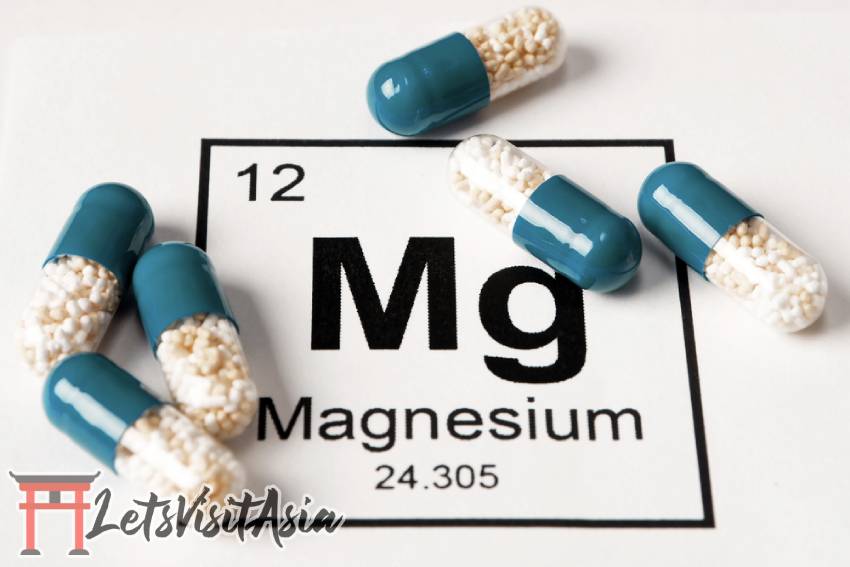Table of Contents
You’re most likely here because you’re looking for ways to help you recovery from Jet Lag. And you’ve found out that supplementing Magnesium may be one of those ways.
It’s no surprise you’re looking for cures. Since jet lag is the worst thing about long-flights and traveling around the world – in fact, we’ve experienced jet lag returning from Japan (to the US) quite frequently.
Well, the good news is that you’re correct. Supplementing with magnesium can indeed help out while you suffer from jet lag after a long flight.
In this article, we’ll explain how and why taking magnesium for jet lag works.
Does Taking Magnesium for Jet Lag Work and Why?
We’ve already given you the quick answer: Yes, taking magnesium can indeed help you recover from jet lag.
So, now, we’ll go into more detail on why it works.
Magnesium plays a role in regulating your circadian rhythm (also known as “body clock”)
Magnesium is known to be a calming mineral, which can support better sleep. But scientific clinical studies have shown that levels of magnesium in cells rise and fall in correlation with the 24-hour sleep and wake cycle, and that impacts the cells internal clocks 1.
If the above was too “sciencey” for you, then in plain English, it means that magnesium plays a big part in regulating your sleep pattern or body clock (aka circadian rhythm).
Your circadian rhythm regulates your sleep-to-wake cycle and therefore determines when you feel sleepy at night. Since magnesium levels rise and fall in correlation to this, informing your body when it’s time to go to bed and get up in the morning.
As a result, optimizing your magnesium intake shortly before going to bed can help fix your sleeping pattern and get you back on the right path.
Melatonin is another ingredient often found in sleeping pills that has shown to regulate your circadian rythym too. Which is why we often take melatonin for travel to Asia too.
Editor’s Note: Read our Performance Lab Sleep Review to learn about our recommended natural sleep aid that contains both magnesium and a natural source of melatonin.
Can You Consume Enough Melatonin To Help With Jet Lag Through Natural Food Sources?
One thing to remember is this: if you can consume enough nutrients naturally through your diet, then that should be your 1st option.
It’s often recommended for women to aim for 310 to 320 milligrams (mg) of magnesium per day. With men recommended to aim for around 400 to 420 milligrams 2.
However, a medium avocado contains around 58 mg of magnesium, meaning men you’d have to attempt to eat 4-5 per day.
I mean, I’m a big fan of guacamole once in a while, but that’s is more avocado than you’d probably like to eat on a daily basis, right?
For this reason, the easy option in this scenario is to choose a high quality multivitamin supplement to take on your travels. We take both a natural sleep aid as well as a premium multivitamin (if you’re interested, check out our Performance Lab Multivitamin Review).
Conclusion: Taking Magnesium for Jet Lag Is a Good Idea
You probably came to read this article wanting to find out if taking magnesium to help you deal with (or recover from) jet lag was a good idea or not.
The answer is: yes, it is a good idea.
In quick summary, magnesium is a calming mineral that helps to regulate your circadian rhythm due to the magnesium levels in your cells rising and falling throughout the day.
As a result, if your circadian rhythm has been negatively impacted by jet lag after a eastbound long flight, then taking magnesium before your bed time may help get your sleeping pattern back on track once home.
Related Posts:
- Immune Support for Traveling
- Best Sleeping Pills for Long Flights
- How to Deal with Flying Anxiety
- Where to get Sleeping Pills in Singapore
- Sleeping Pills for Flying Anxiety
References:
- University of Edinburgh. Vital nutrient has key role in keeping body clocks running on time. April 13, 2016.
- National Institutes of Health. Magnesium: Fact Sheet for Health Professionals. Available online: https://ods.od.nih.gov/factsheets/Magnesium-HealthProfessional/

